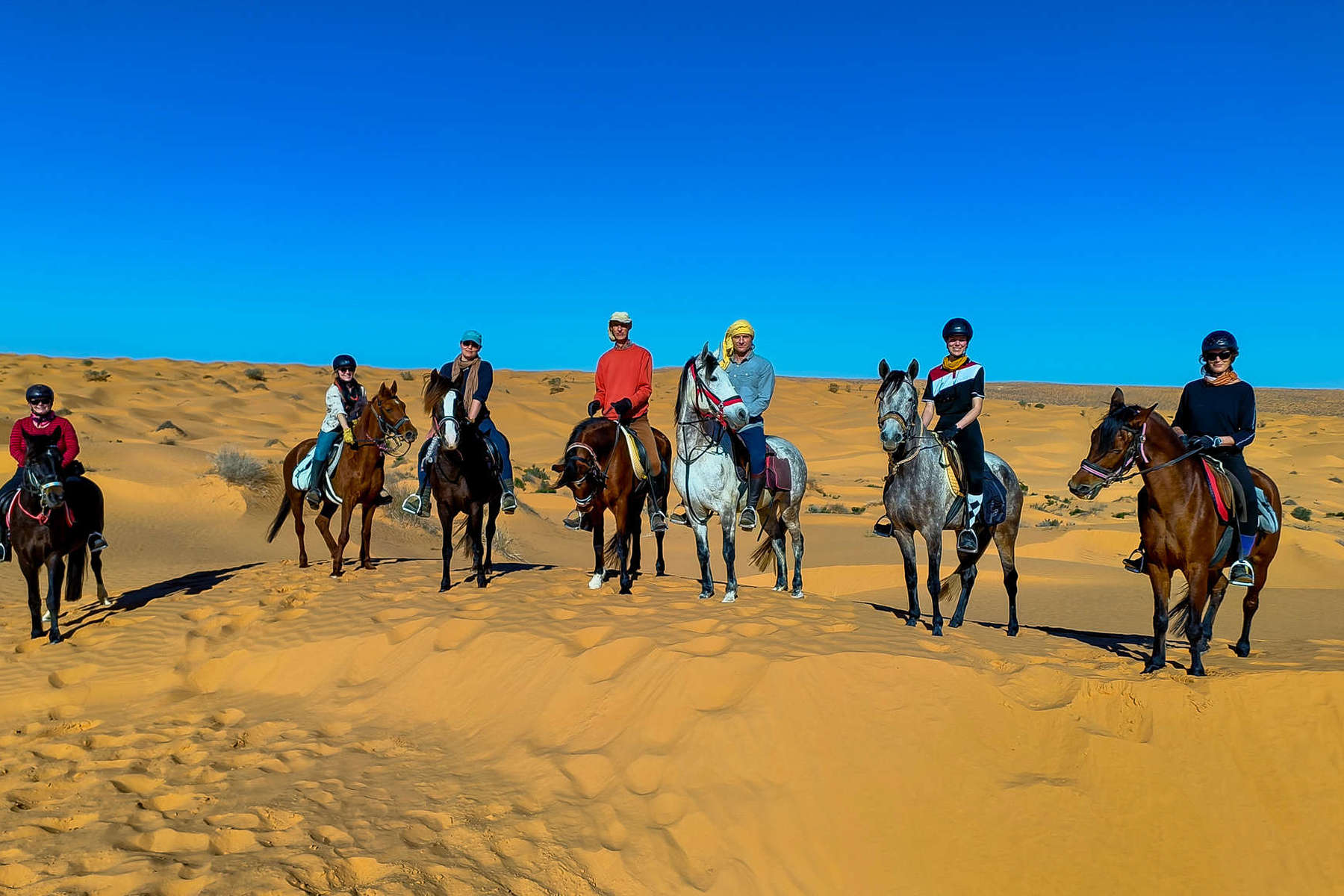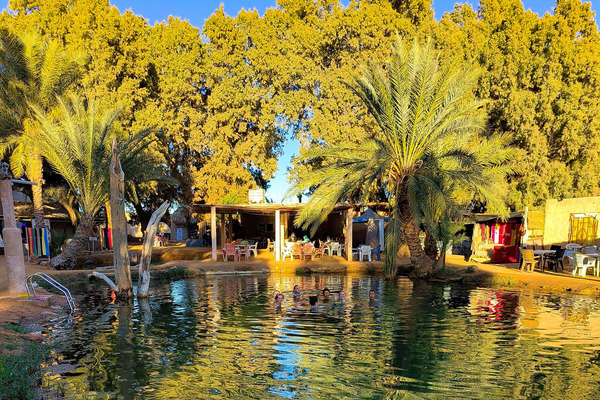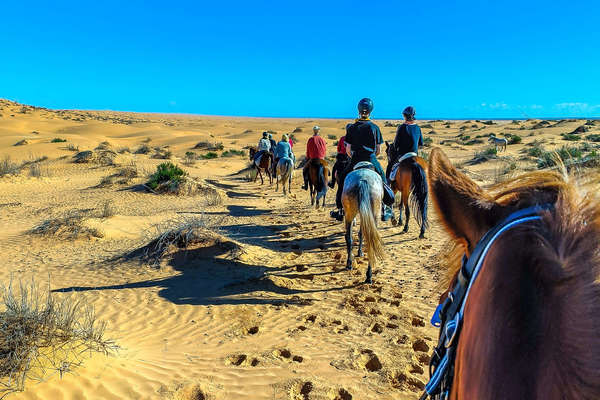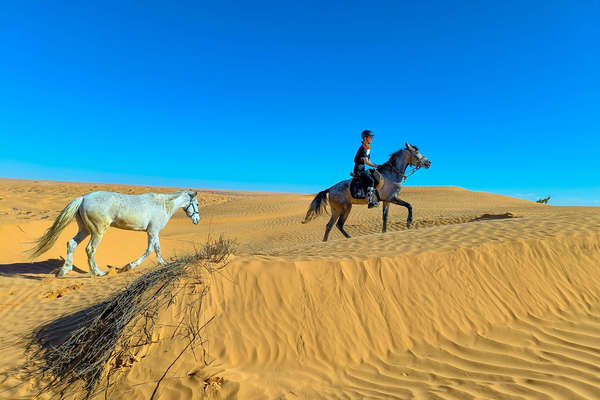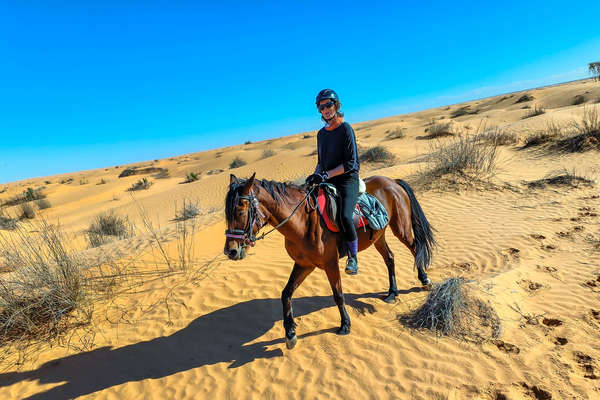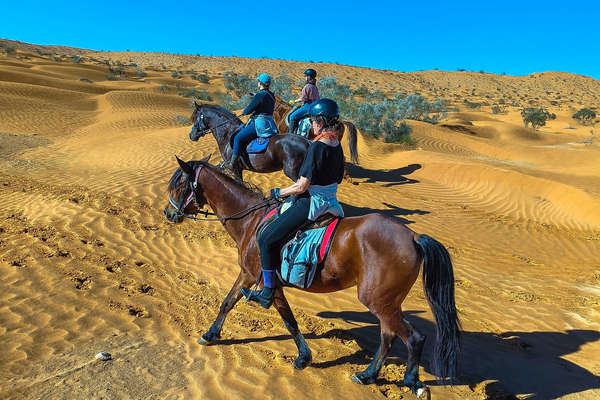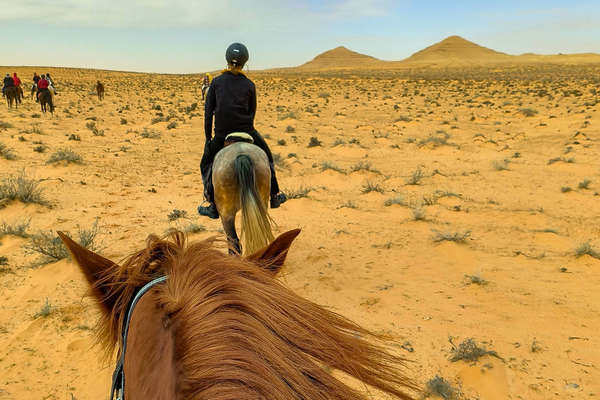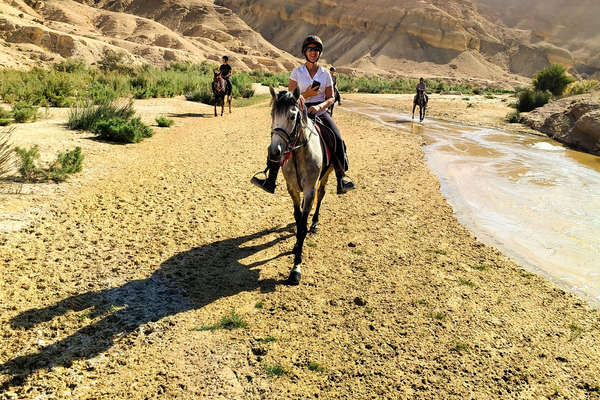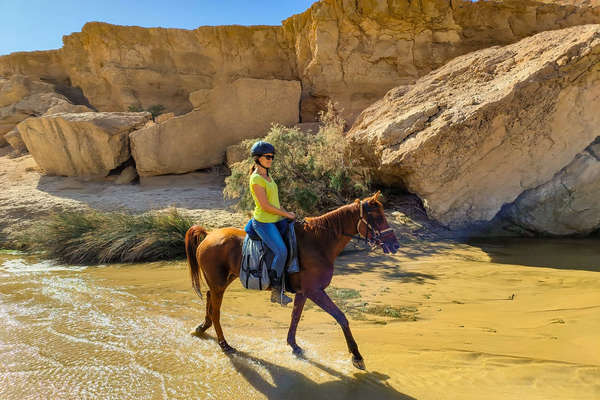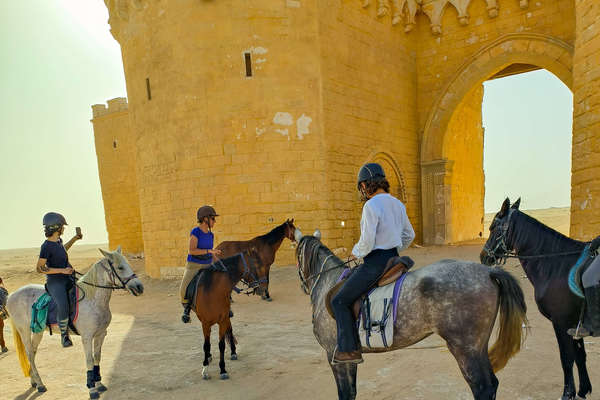Comfort
You will stay in a two-person tent with mattresses and pillows, or a traditional woven Bedouin tent. There will also be a Caidal tent for logistics, along with a shower tent and a toilet tent. The final night will be spent in a 4-star hotel in in Djerba.
Meals
Breakfast will include bread, fruits and cereals. Lunch will be traditional Tunisian cuisine with salads, and you'll eat cooked dishes in the evening (meat, vegetables, and rice). Water is provided on the trail - please bring your own bottle to fill in the mornings.
Special diets can be accommodated, however please note that some foods can be difficult to find in Morocco. Certain diets may incur a supplement (gluten-free diets can be accommodated at a supplementary charge of €100/£90/$110 for instance). All dietary requirements must be specified at the time of booking.
Climate
The climate of Djerba is Mediterranean but tends to be semi-arid due to its location at the crossroads of Mediterranean and Saharan air masses. The annual average temperature is around 20°C, with monthly temperatures not exceeding 30°C or falling below 8°C.
In the Grand Erg Oriental and south of Douz:
From October to November and from February to April, temperatures are pleasant to warm, ranging from 35°C/20°C (October and April) to 25°C/8°C (November, February and March).
In the heart of winter, mornings and evenings are cool to cold (down to -5°C in late December). At midday, temperatures reach 18°C/20°C but drop fairly quickly in the evening.
In summer, it is very hot (around 45°C) and treks are not organised during this period.
Tips
It is customary to tip as a sign of appreciation. We would recommend €50-€60 for the whole team.
Packing list
Head
- Riding helmet: On this ride, helmets are mandatory. Some manufacturers now offer ventilated, sturdy and lightweight riding helmets suitable for all climates. There are also protective shells to wear under your hat or Western-style helmet hats.
- Cap or sun hat: For sun protection when not riding.
- Bandana, scarf, or neck wrap: To protect your neck or face from dust and sun.
- Sunglasses - with a cord attached so they don't fly off when riding
- Hat or balaclava in winter (December and January).
Upper body
-Thermal underwear (December and January)
- Long sleeved shirts provide protection from the sun and dust
- T-shirts
- Fleece or jumper (from November to mid-February)
• A warm jacket (waterproof and breathable) from December to mid-February. Waterproof wind-breaker the rest of the year.
- Casual clothes for the evening
Legs
- 2 pairs of riding breeches or long leather chaps.
- 1 spare pair of trousers (hiking trousers, jeans, or equivalent).
- Tights or equivalent (December to mid-February).
- A swimsuit may be useful (for swimming or bathing).
- Cotton or non-irritating synthetic underwear.
Feet and Hands
- Comfortable riding boots. We recommend short boots with half chaps as long chaps/long boots can get very hot.
- Sandals, flip-flops or trainers for moving around the camp and for the evening.
- Several pairs of socks.
- A pair of gloves: To protect from the sun, cold, and friction.
Horseback Essentials
- Soothing cream: Very useful for areas of skin irritated from long hours on horseback.
- Keep everything in your jacket or a waist pouch (not on your back): lip balm, sunscreen, passport, small camera, or mini waterproof camera, cords, sunglasses – easier access than saddlebags.
- Backpacks are not permitted when riding.
Sleeping
- Warm sleeping bag comfort rating 2°C/-5°C from October to November and February to April and a -5°C or -8°C sleeping bag for December and January.
- It is also recommended to use a silk sleeping bag liner for extra warmth.
Miscellaneous
- 60-80L travel bag, preferably a soft bag (front opening or backpack).
- 1.5L water bottle or equivalent.
- Headlamp with spare batteries and bulbs.
- Toiletries (including biodegradable wipes).
- Toilet paper and lighter to burn after use.
- Swiss army knife or equivalent (in checked luggage!).
- Small plastic bags for rubbish disposal.
- Earplugs: Useful for light sleepers in shared accommodation.
- 25-30L backpack.
- Camera (with a spare battery).
First Aid Kit
- For safety, list any medication allergies in your first aid kit.
- Personal medications.
- Broad-spectrum antibiotic.
- Aspirin or paracetamol.
- Anti-diarrhoeal medication.
- Rehydration sachets (dioralyte or similar)
- Spare prescription glasses/contact lenses
- Vitamin C.
- High-protection sunscreen for lips and skin.
- Eye drops.
- Moisturiser.
- Adhesive bandages.
- Elastic adhesive bandage (10 cm wide).
- Band-aids.
- Ready-to-use disinfectant wipes.
- Micropur or Hydroclonazone tablets to purify water.
- Insect repellent cream and spray.
- Blister plasters in case of any rubs.
General Information
- In case of lost documents, keep a copy of your passport in a separate location from the original.
- Bring bags for toxic waste (batteries, aerosols, ointment tubes, film packaging, etc.) to take home where recycling is well organised.

